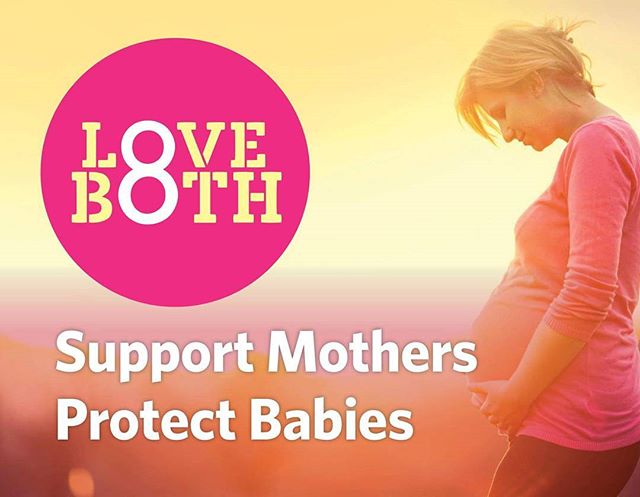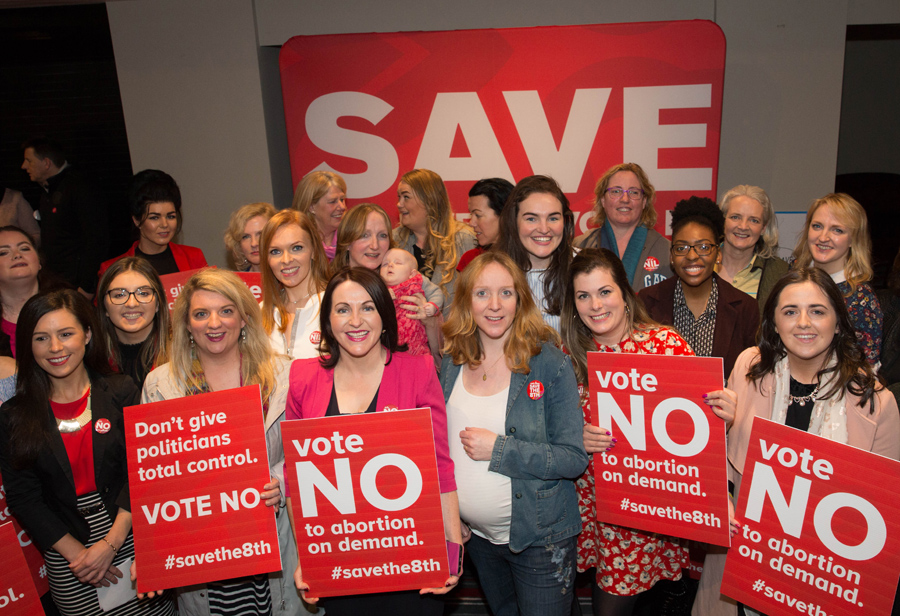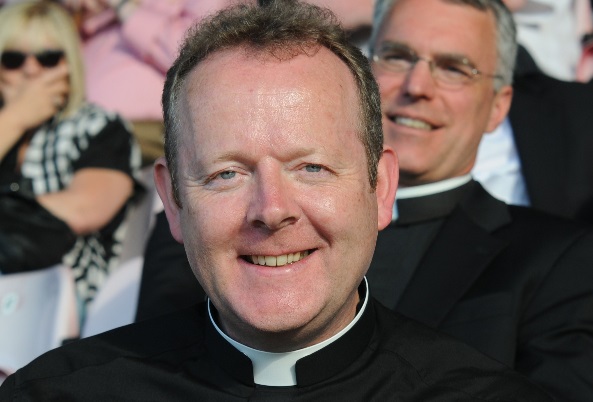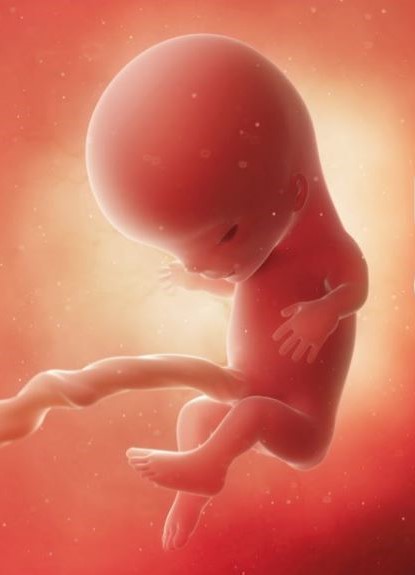
One of the main campaigning groups against repeal of the 8th amendment, Love Both, launched their campaign in Dublin yesterday. Numerous speakers hammered home the point that repeal would be followed by “abortion on demand” and the only way to stop that would be to vote “No”. Love Both legal consultant Caroline Simons said if the Eighth Amendment is repealed, “Ireland will go from being a country that protects unborn babies to one of the most extreme abortion regimes in the world”. She continued: “The Government’s referendum proposal is even more frightening than England’s abortion law, where 1 in every 5 babies loses his or her life to abortion. If repeal happens, the Government is committed to legislating for unrestricted abortion up to 12 weeks. The proposed legislation also allows for abortion on vague and undefined ‘health’ grounds, up to viability and even up to birth where the baby has a possible terminal illness and in other circumstances as well”.
Ms Simons said that voters need to be aware of the extreme nature of the abortion regime thay would get post-repeal. “Voters who support abortion in so-called limited circumstances need to know that what they hope for with repeal and what they’d get are two entirely different things. A vote for repeal is a vote for abortion on demand. It didn’t have to be this way. The Government could have chosen to amend the Eighth Amendment for so-called hard cases, while leaving some form of protection for unborn babies in the Constitution. But instead they opted for a proposal that takes away all meaningful protections from unborn babies and allows abortion on demand”.
She concluded with a plea: “The only way to stop this from happening is to ‘VOTE NO’ on 25th May”.

Fianna Fáil has said it will not support a Solidarity private members’ bill on sex education in schools that would trample the right of schools and parents to decide for themselves the content of such courses.
The ‘Provision of Objective Sex Education Bill’, which was debated in the Dáil on Wednesday, purports to guarantee to students a right to receive factual and objective relationships and sexuality education without regard to the school’s ethos and would contain provisions for education on consent, on different types of sexuality and different types of gender, on methods of contraception, and on abortion.
Previously, the the Oireachtas Committee on the Eighth Amendment recommended a review of sexual health and relationship education in primary and post-primary schools, colleges, youth clubs and other organisations.
Fianna Fáil’s education spokesman Thomas Byrne said he was concerned that the Bill would result in changes to the “characteristic spirit of schools” and had been drafted without consulting education partners. He said that curriculum issues should not be set in legislation: “we have a principled objection to this Bill on the basis that Ireland has never legislated in law for a curriculum of any type”. He added: “We have never put in law what should be taught in our classes. We have left it to teachers and other experts to decide, and politicians have not got involved.”

Repealing the Eighth Amendment to the Constitution will constitute consent for Ireland to have a “liberal abortion regime”, the Save the 8th campaign has said.
Speaking on The Irish Times’s Inside Politics podcast, the campaign’s communications director, John McGuirk, said many people were unaware of the implications of a vote for repeal. Most voters believed they were supporting legislation allowing for abortions in cases of rape, incest and fatal foetal abnormalities, not terminations of “healthy babies of healthy mothers up to 12 weeks and beyond”, he claimed. The legislation outlined by the Government would allow unrestricted abortion for the first three months of pregnancy, and abortion on vague ‘mental health’ grounds up to the sixth month of pregnancy. That mental health ground accounts for 98% of the abortions carried out in the UK where there is one abortion for every four live births.




The Save the 8th campaign has called on Irish television stations to show a video-scan of a living, child in the womb at 12 weeks gestation as part of their referendum coverage. The video is featured in a social media campaign promoted to Facebook users over the age of 18 in Ireland.
Speaking about the campaign, Save the 8th’s Niamh Ui Bhriain said: “It is important that this debate is informed and that people have access to basic information. The Government is asking us to legalise abortion for any reason up to three months”.
Ms Ui Bhriain said a fully informed debate need not show graphic images, or upsetting images, but it should show, at a very basic level, what a child in the womb at that age looks like. “Every mother who has had a child in the modern era has seen one of these scans – but most voters have not. The scan shows clearly a developing child, with the identifiable form of a human being, moving and kicking inside the womb”.
She said the Irish people are being asked to give their approval for a proposal that would allow such children to be legally killed. She added that, while many people believe that at 12 weeks, they are voting on “a clump of cells”, the simplest look at a 12 week scan proves this to be untrue.
She concluded: “We are calling on RTE and TV3 to include a video of such a scan in their television coverage of the referendum campaign. If they want a fully informed electorate, they will do so.”

A group of Lawyers have argued that repeal of the Eighth Amendment would remove all constitutional protection from the unborn and clear the way for an expansive abortion regime. in a letter in yesterday’s Irish Examiner, the lawyers said he Supreme Court has clarified in the recent case, M v Minister for Justice, that the unborn have no constitutional rights apart from the Eighth Amendment. They said the Government is proposing an abortion regime that is comparable with that in Britain and is even more extensive than it during the first 12 weeks. With the Eighth Amendment repealed, they wrote, “it would be impossible to challenge successfully the constitutionality of this expansive abortion regime and it may prove very difficult to prevent a future Oireachtas from widening the grounds for abortion even beyond the current expansive proposal”.
Furthermore, they wrote: “The citing of hard cases is not relevant to the proposal in this upcoming referendum. We are not being asked to vote for abortion in certain limited cases, we are clearly being asked to remove all constitutional rights from unborn humans”. They concluded: “We all value our own life. To set at nought the value given to the lives of any cohort of humans is chilling. The enormity of the decision we are about to make as a people cannot be overstated”.

Access to abortion is a “key right” for people with intellectual disabilities, according to Inclusion Ireland, the national association for people with an intellectual disability. The group is taking an official position against the Eighth Amendment, and will be campaigning for its repeal. This is despite the fact that in overseas jurisdictions abortion disproportionately targets unborn children with disabilities.
“One of the key rights we’ve been campaigning for when it comes to rights for women with intellectual disabilities, is whether or not to have children and how to space them”, said the group’s CEO, Paddy Connolly. He said said that the Eighth Amendment imposes a restriction on bodily autonomy, amounting to a “human rights abuse”, because it prevents women from making choices about reproduction. This impacts women with intellectual disability more profoundly than other women as their ability to travel to the UK for abortion is limited.
The move was criticised by campaigners in support of the eighth amendment.

A former TV3 political correspondent has called on the Catholic Church to provide full sacramental marriage for same-sex couples. Ursula Halligan, who came out as gay prior to the Marriage referendum in 2015 and campaigned for its passage, was attending a conference for Catholic reform groups at the weekend ahead of the World Meeting of Families (WMOF) in Dublin in August. She described herself as a “person of faith and a committed Catholic”, but said the Church’s teaching on same-sex relationships was “deeply insulting and offensive”.
“I believe my love is as good as anyone else’s love and as a Catholic I’m looking for full sacramental marriage for same-sex couples,” she added. The Church’s teaching on divorce and remarriage was also attacked.